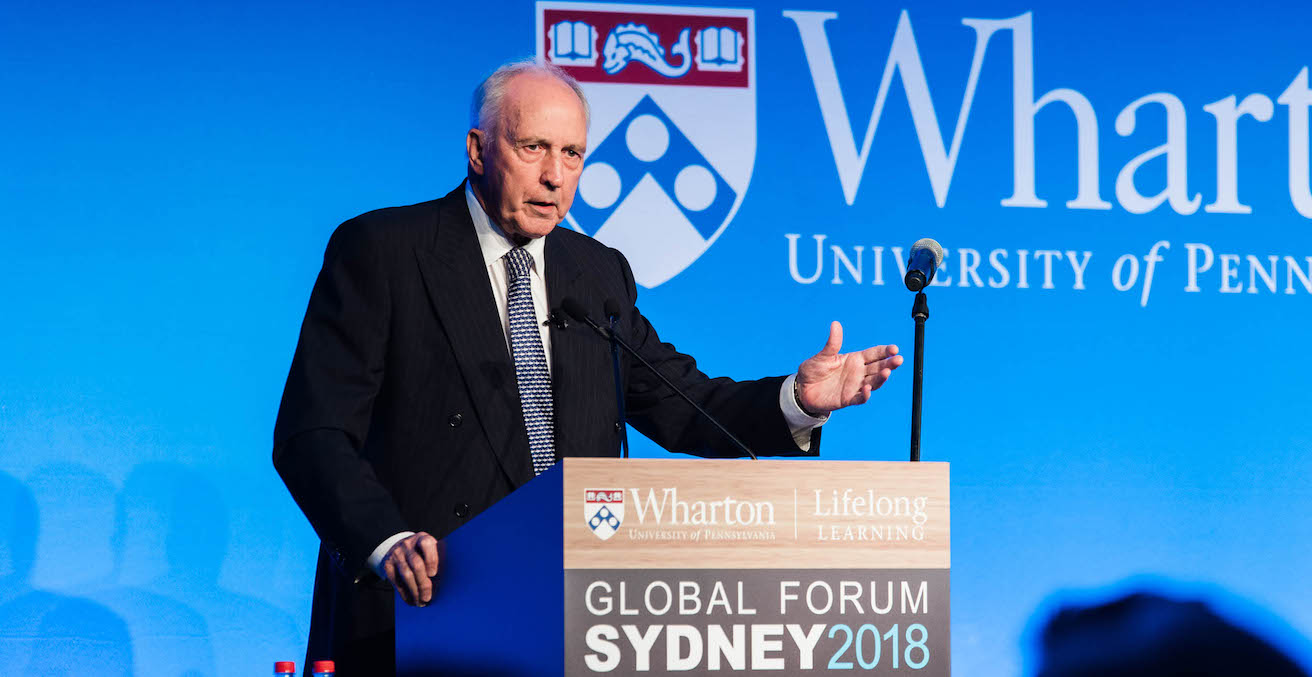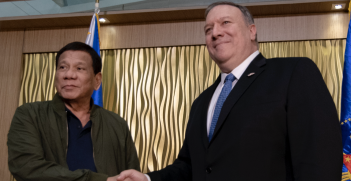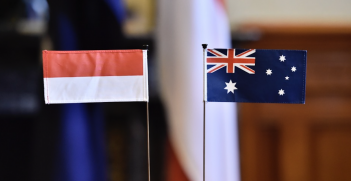US and China: Finding the Balance of Power

US President Donald Trump may have alighted on the right policy when it comes to best managing the relationship between the US and China today. It’s a little bit of Kissinger, with a balance of power strategy backed by partnership diplomacy.
Given the big changes in the world, it may be worth talking about some of the geopolitical and geostrategic matters. Political and strategic events, and economic events, particularly in our interconnected world where everything is done in real time, mean that one has to have a feeling for the vector forces as they affect you and change you.
The Cold War was the epiphany at the end of the twentieth century which nobody expected. The polarity of the Cold War consolidated alliances in the West, but it also snap-froze, for 40 years, the promise and opportunity of post-colonialism. The post-Cold War trade and capital arrangements have reinstated population as the principle driver of GDP, as it was before the industrial revolution. The states with the largest populations will again be the largest states by way of GDP.
The days of the comfortable multilateralism superintended by the United States along Jeffersonian principles, is now fading to a world of great power entities and great power politics.
Missed opportunity
America was not alert to the post-Cold War power shifts. The US had a chance to remake the world at the end of the Cold War. George Herbert Bush spoke about it in a very famous speech but left office before he could do anything about it. Bill Clinton was a domestic politician, he wasn’t about remaking the world.
In the triumphalism of the unipolar moment, the United States saw itself as having defeated the Soviet Union. Francis Fukuyama wrote his book ‘The End of History’; it was all over red rover, we’re all Jeffersonians now, the market system has won.
We lost the two Clinton terms as huge changes in the post-colonial world were taking place. We then had George W. Bush along with Dick Cheney, Paul Wolfowitz and Donald Rumsfeld. They blew two terms trying to propagate American values in the Middle East.
Meanwhile, China was growing in the East, and the European Union was consolidating with East European states joining it.
Then we had Barack Obama who had the greatest opportunity in history, the most powerful mandate ever to reshape the world. Obama kept the world free from major conflicts, he also substantially underwrote some of the American recovery; but through timidity, through a lack of policy ambition, when it came to the big game, we lost two more terms.
The US, for 24 years has gone without a strategy. If you’re running the world and you’re Number 1, and you don’t have a strategy for a quarter of a century, you have a problem.
Meanwhile China has risen in the East.
Confucian characteristics
It is worth reflecting, when talking about the Atlantic and the Pacific, that the East has never been a compendium of states identified by a common culture or religion in the way the West has always had common bindings. Asia has always been a hierarchy, with China at the top, rather than a balance of power or equilibrium of sovereign states on Westphalian principles.
China’s approach has always been conceptual, whereas America’s approach is pragmatic. China has a Confucian sense of itself and a long tradition amongst the population of hierarchy and authority, of a competent bureaucracy and governance.
It is part of the reason, no doubt, that Xi Jinping identifies with these characteristics, with the underlying characteristics of the former imperial system, but now with the Chinese Communist Party (CCP) in the emperor’s chair; a competent bureaucracy underneath, a compliant community, and an authoritarian manager.
China rejects the proposition that the international order is underwritten by the spread of liberal democracy. That’s always been the underlying proposition that’s run foreign policy out of the United States and out of countries like Australia.
But China has not always rejected the liberal democratic proposition. Between 1978 and 1989, Deng Xiaoping and his CCP Secretary, Hu Yaobang, and their premier, Zhao Ziyang, were seeking to build a more transparent and participatory China. It was to be one with multiparty elections and the rule of law; the effective separation of party and state.
That all went down at Tiananmen Square in 1989. And it was Deng Xiaoping who made the decision to walk away from it. He abandoned his party secretary and former Premier Zhao Ziyang and his ideals for untrammelled primacy of the party.
But Deng stuck with the deregulation and the market system. The Shanghai Gang—Jiang Zemin and Zhu Ronghi—pushed the reforms through, but the 10 years of Hu Jintao and Wen Jiabao saw the structure fall into hapless corruption.
With Deng having made the original decision for party primacy, Xi’s task has been to recover the legitimacy of the party, hence the crackdown on corruption.
Balance of power
In this context, America’s policy for over a century has been to prevent hegemony in Asia. Its difficulty is, as a key participant, its metropolitan home and centre of gravity is located far from the geographic centre of East Asia.
China is a stabilising force on the Asian mainland—it’s a continental power. The US is a naval power.
I think the key for us is that the preservation of peace between these two great states, which really depends on the equanimity in the world, depends upon three things: it depends upon restraint; it depends upon force; and it depends upon legitimacy.
Finding that balance between force, restraint and legitimacy—and the ability to ensure that the competition remains political and diplomatic—is the great challenge for the United States and China.
As Henry Kissinger put it: we need a balance of power strategy but with partnership diplomacy.
Given the enormous and rising power of China and its ambitions, with its growing middle class and its prerogatives in the world as a major state, it requires a balance of power strategy. But we must deal with this using partnership diplomacy because if ever the competition becomes military it will be like 1900-1914; once you give the battlefield commanders control, you can say ‘goodbye’.
The right direction
And, perhaps strange but true, President Trump is following that formula. He says, ‘Let’s have a better relationship with China. We’ve got to keep them honest on steel and tariffs, but let’s have a better overall relationship with them.’
In a major foreign policy speech last April, President Trump said “We desire to live peacefully and in friendship with Russia and China. We have serious difficulties with these two nations, and must regard them with open eyes, but we are not bound to be adversaries. We should seek common ground based on shared interests.”
This, I think, is a balance of power strategy but with partnership diplomacy.
It is certainly a better policy than the US was endeavouring to put into place under Barack Obama and Hillary Clinton—to maintain the strategic hegemony of the United States with the so-called pivot. The pivot was essentially about reinforcing American naval forces in the Asia-Pacific area, particularly the South China Sea, with a clear intention of America maintaining military power hegemony over the risen China.
I always saw this as a pretty forlorn prospect.
I’ll make the point, and I’ve made it to the Americans often, America’s future in Asia—and it should have a future in Asia—is as a balancing power—the way Britain was to Europe during the periods of Bonaparte, Kaiser Wilhelm and Hitler. It was always the offshore power that provided the balance of power in those three important conflicts.
America can still frame and guarantee the Atlantic, providing it comes to terms with Russia, but it can no longer frame and guarantee the Pacific.
China will never be a strategic client of the United States in the way Japan has been a strategic client for 70 years. This is not going to happen.
China seeks “a new international political and economic order”. As Xi Jinping says in every speech he makes, ‘What we need is a new system of world governance, a new international political order’. The Chinese are arguing for the democratisation of international relations. China will not accept a strategic order led, in a proprietary sense, by the United States—what we formerly called the Washington Consensus.
For an autocratic show, which China is, it actually wants a democratised UN-based system of international relations, where each state has its own rights to pursue its own development ethos and its own principles.
We haven’t yet got to a balance of power point, but Trump has, surprisingly, put his hand up for the right policy.
Those true friends of America—and I’m one—would say the US has a relevant place in Asia as a balancing power, but if it tries to remain the hegemon it will all come unstuck.
This is our big foreign policy challenge in Australia, and it’s really the great foreign policy challenge between the two.
Paul Keating was the 24th prime minister of Australia from 1991-1996. This is an edited version of a speech delivered at the Wharton Global Forum in Sydney on 9 February 2018. A recording of the full speech is available here.
This article is published under a Creative Commons Licence and may be republished with attribution.





